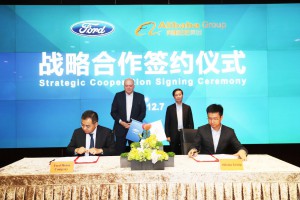
Ford CEO Jim Hackett, back left, and Alibaba Group CEO Daniel Zhang, back right, oversee the signing of a three-year deal between the two companies.
In the event it wasn’t clear that Ford is serious about increasing its sales in China, it’s new partnership with Alibaba Group should clear up any confusion.
The new three-year agreement announced today with Alibaba, essentially China’s version of Amazon, may offer Ford an online outlet for its vehicles. The deal, which was reported to be in the works earlier this week by TheDetroitBureau.com. The deal came at the end trip by Ford Chairman Bill Ford Jr. and CEO Jim Hackett.
Last month, Ford committed to a more than $750 million tie-up with Anhui Zotye Automobile Co. to build electric vehicles in China. Earlier this week, Chairman Ford and Hackett announced in plans to bring 50 new vehicles to the Chinese market by 2025, including 15 EVs as well as building five new vehicles locally in that country.
Under this new three-year agreement, the two companies will “explore areas of cooperation that are re-shaping the automotive industry in China and around the world.”
(Ford moving EV production to Mexico. Click Here to find out why.)
Ford will cooperate with Alibaba’s four business units in operation system, cloud computing, digital marketing and online retail. The companies will jointly explore opportunities in mobility services, connectivity, cloud computing, artificial intelligence and digital marketing.
“China is one of the world’s largest and most dynamic digital markets, thriving on innovation with customers’ online and offline experiences converging rapidly. Collaborating with leading technology players builds on our vision for smart vehicles in a smart world to reimagine and revolutionize consumers’ mobility experiences,’’ said Jim Hackett, Ford president and CEO.
The move will have a big payoff for Alibaba as well as it will learn about outside markets.
(Click Here to see more about Ford’s effort to test online sales in China.)
“Alibaba is excited to redefine the consumer journey and user experience for automobiles together with Ford Motors,” said Alibaba Group Chief Executive Officer Daniel Zhang. “Our data-driven technology and platform will expand the definition of car ownership beyond just having a mode of transportation and into a new medium for smart lifestyle.”
In the initial phase, Ford and Alibaba will explore a pilot study on digital solutions for new retail opportunities at various stages of the automotive ownership cycle, from pre-sales and test drives to leasing options.
By leveraging both parties’ areas of expertise, both companies are investigating ways that mobility technology could redefine online retail marketing, distribution strategies, cloud connectivity and infotainment services.
(For more on Ford’s product plans for China, Click Here.)
Ultmately, the deal is symbiotic for the companies: Ford gets to learn more about Chinese consumers and enjoys more avenues to sell its vehicles — it was a latecomer to the Chinese market and it still playing catch up in some ways. Meanwhile, the insular Alibaba, which is called China’s Amazon, gets to learn more about the global marketplace as it will look to run with Amazon in other markets.
